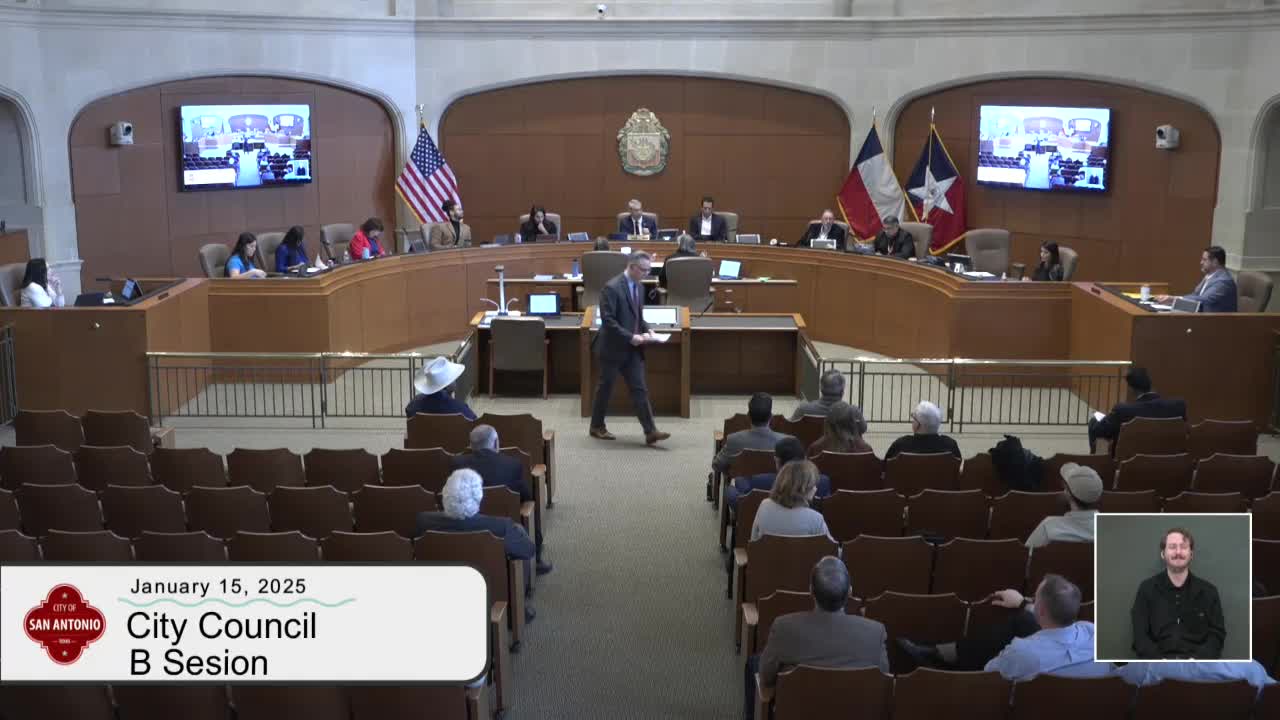Council briefed on revised procurement thresholds; staff to return with ordinance Jan. 30
Get AI-powered insights, summaries, and transcripts
Subscribe
Summary
City procurement staff returned to council with revised recommendations to adjust which contracts go to council and which may be delegated to the city manager, while keeping the $1 million high‑profile threshold.
City procurement staff returned to the San Antonio City Council on Jan. 15, 2025, with revised recommendations to speed contracting and payment by adjusting which solicitations go to council and which may be delegated to the city manager.
Troy (procurement staff) summarized prior recommendations and changes after council feedback. Troy said the earlier proposal to raise the "high profile" threshold from $1,000,000 to $5,000,000 would not move forward; instead, staff recommended keeping the $1,000,000 high‑profile definition. "We're recommending keeping our current definition in place at $1,000,000 and not moving to 5,000,000," Troy said.
Staff said the revised package narrows the original delegation proposal. Where the procurement office had initially proposed delegating authority for contracts under $2.5 million, staff now recommend delegations for specific solicitation categories (architecture and engineering, construction, other services, professional services) for amounts below $1,000,000. Goods and supplies and fleet purchases are treated separately; goods and supplies remain at a higher threshold in the revised approach and fleet vehicle acquisitions adopted in the budget would be delegated to the city manager.
Troy presented statistics intended to show how the delegation would change the number of council agenda items and the dollar volume overseen by council. Under the revised recommendation, staff estimated the number of procurements delegated to the city manager would fall and the total value delegated would drop from roughly $124 million (under the higher threshold) to about $50 million, leaving the majority of spending on council agendas. Troy said staff plan to publish a quarterly report of delegated awards so council and the public can track activity.
Council members generally expressed support for the goal of faster procurement but emphasized transparency and the council’s oversight role. Council member Rocha Garcia said he remained focused on accountability: "I still feel like we are the ones ultimately held, accountable," and asked staff to provide historical metrics showing whether prior changes yielded time or cost savings. Several members asked staff to supply revised tables showing how different delegation thresholds (for example, $500,000) would affect counts and values of procurements; Troy said staff could produce that analysis.
Troy asked the council for permission to pursue ordinance language and a timeline: if council agrees, staff plan to bring an ordinance for consideration on Jan. 30, 2025, and to begin internal business‑process changes with an intended effective date in April. "If these things are acceptable, we'd like to move forward with, the items that need to be embodied in an ordinance and move forward for ordinance consideration by city council on January 30th," Troy said; he added staff would use the intervening weeks to finalize reporting and business‑process changes.
Several council members requested clearer, ongoing reporting. Council member Courage proposed a standing table—similar to the five‑year capital plan—listing budgeted procurements, anticipated solicitation dates and a checkbox for completed awards to make it easier for councilmembers to see what has been budgeted versus what was newly proposed on agendas.
No ordinance or vote occurred at the briefing; staff framed the session as a revised proposal and asked for permission to return with ordinance language and implementing business processes. If moved forward, the change would shift some solicitations from council agendas to delegated approvals while keeping public reporting and quarterly reviews in place.
Ending: Staff will prepare ordinance language for Jan. 30 consideration, produce follow‑up analyses requested by council (metrics on prior process changes, threshold sensitivity tables), and design quarterly reporting on delegated procurements.
